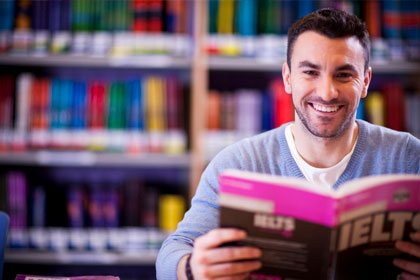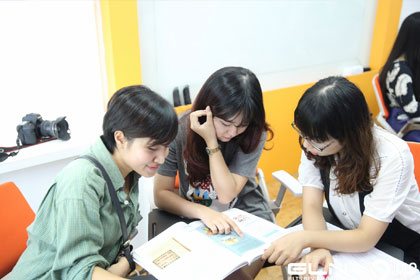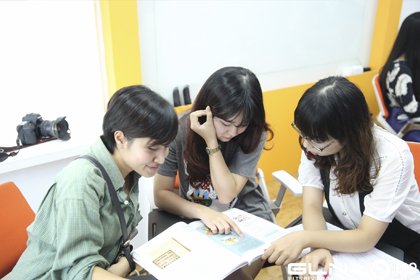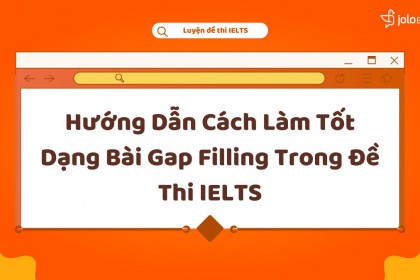Education là một trong những chủ đề "quen mặt" nhất trong IELTS Writing Task 2. Ở chủ đề này, đề bài có thể khai thác đa dạng mọi vấn đề xoay quanh Giáo dục như: chính phủ tài trợ học bổng cho học sinh/sinh viên, phương pháp dạy và học ở phổ thông, quản lý trường học, cách ứng xử trong môi trường sư phạm,.. Với vô vàn những dạng bài và hướng tiếp cận khó nhằn như vậy, bạn cần bổ sung ngay cho mình bộ từ vựng riêng cho topic Education để dễ dàng "khai phá" mọi đề Writing. Hôm nay, JOLO sẽ cung cấp cho bạn tổng hợp Từ vựng, Phrases, Collocations, Idioms và bài mẫu band 7.5+ về topic này giúp bạn học tập dễ dàng hơn nhé!
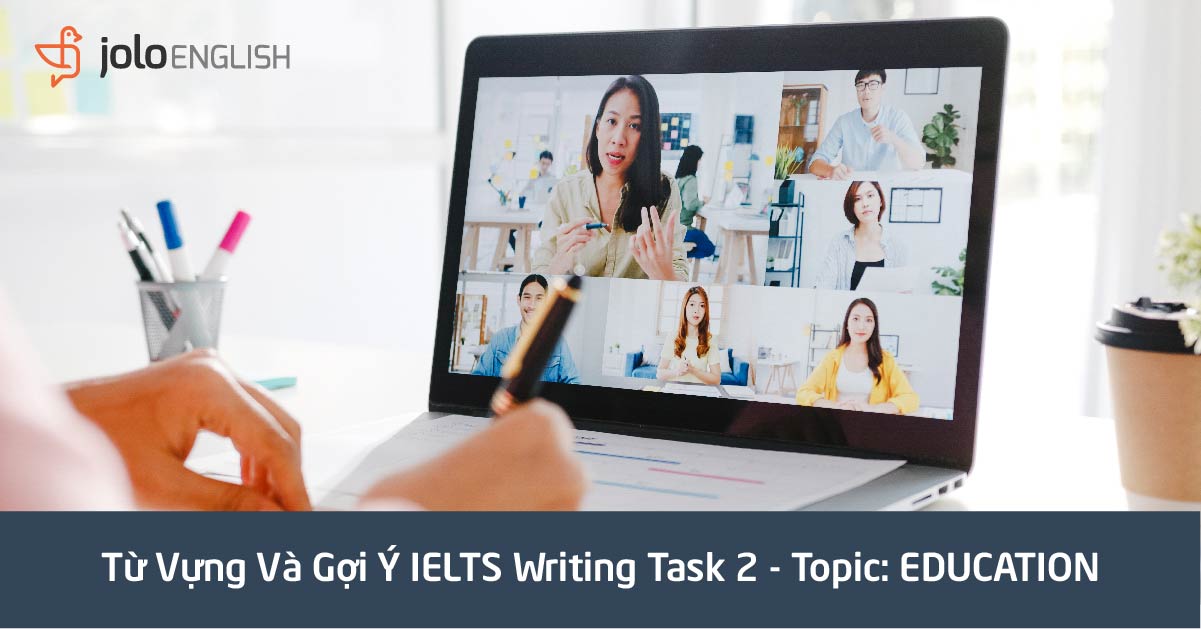
TỪ VỰNG IELTS CHỦ ĐỀ EDUCATION
Từ vựng về cấp bậc giáo dục
- Kindergarten (n): Mẫu giáo
- Primary school (n): Tiểu học
- Secondary school (n): Trung học cơ sở
- High school (n): Trung học phổ thông
- University (n): Đại học
- Academy (n): Học viện
- College (n): Cao đẳng
- International school (n): trường quốc tế
- Private school (n): trường tư
- Public school (n): trường công
Phrases/Collocations về Education
- To attend a lecture: tham gia bài giảng
- To attend a tutorial: tham gia lớp học với giáo sư theo nhóm nhỏ
- To broaden one’s horizon/perspective/experience/knowledge: mở rộng vốn kiến thức
- To be admitted to a top-tier school: được nhận vào trường hàng đầu
- To complete/graduate high school: tốt nghiệp trung học phổ thông
- Core subjects such as science, English and maths: những môn học nòng cốt như khoa học, tiếng Anh và toán
- Communication or teamwork skills: kỹ năng giao tiếp hay làm việc nhóm
- To drop out of school: bỏ học
- To deliver a lecture: giảng bài
- To develop/encourage an independent study habit: tạo/khuyến khích thói quen tự nghiên cứu học hỏi
- To do or complete homework: hoàn thành bài tập về nhà
- To do/participate/take part in school activities/sport: tham gia các hoạt động tại trường/thể thao
- To do note-taking: ghi chép, ghi chú lại
- Dissection: sự mổ xẻ động vật nhằm mục đích nghiên cứu khoa học
- To encourage independent learning: thúc đẩy việc tự học
- To engage face-to-face with sb: trao đổi trực tiếp với ai đó
- To enroll on a degree course: đăng ký một khóa học
- Factory of something: chuyên ngành gì
- To fall behind with your studies: học đuối
- To fall behind with study = fail to keep pace with the school/university work: không theo kịp bài vở trên trường
- To get higher academic results: đạt được kết quả học tập cao
- To gain international qualifications: có được bằng cấp quốc tế
- To gain in-depth knowledge: có được kiến thức sâu sắc
- To give feedback to students: đưa ra nhận xét cho học sinh/sinh viên
- To give out or assign homework: giao bài tập về nhà
- Graduated from: tốt nghiệp từ
- To have the opportunity to … : có cơ hội làm gì
- To have a good grasp of something: thấu hiểu/nắm bắt cái gì, hiểu một vấn đề gì đó toàn diện và sâu sắc
- To have an important/vital/essential role to play in sth: đóng một vai trò quan trọng
- To improve educational outcomes: nâng cao đầu ra của giáo dục
- To improve their level of academic performance: cải thiện kết quả học tập/tiến bộ trong học tấp
- To instil in students the value of learning: thấm nhuần giá trị của việc học
- To increase the provision of vocational courses for school-leavers: cung cấp các chương trình/khóa đào tạo nghề cho học sinh đã tốt nghiệp trung học
- Keeping up with the work load: theo kịp với khối lượng công việc hoặc khối lượng học được yêu cầu
- To learn a wide range of skills: học được các kỹ năng khác nhau
- Lab work = laboratory experiments = thí nghiệm trong phòng thí nghiệm
- To lecture in something: giảng về cái gì đó
- To major in physics: chọn vật lý là môn học chính ở đại học
- Opposite-sex classmates: bạn khác giới
- Pay off a student loan: thanh toán khoản vay sinh viên
- To pass/fail the exam: đậu/ rớt kỳ thi
- To pass a test/graduate with flying colours: thi điểm cao/tốt nghiệp với kết quả cao
- To pursue higher education: theo đuổi bậc học cao hơn
- Play truant/truancy: trốn học
- To sit an exam: tham gia 1 kì thi
- To study abroad = to study in a different country: du học
- To top international educational league tables: xếp đầu bảng giáo dục quốc tế
- To improve educational outcomes: nâng cao đầu ra của giáo dục
- To take a year out: nghỉ một năm để trải nghiệm
- continuous assessment: tiếp tục làm tiểu luận (thay cho thi cử thông thường)
- To take advantage of distance learning educational programs: tận dụng lợi ích từ các chương trình giáo dục từ xa
Idioms về chủ đề Education
- A for effort: điểm 10 cho sự nỗ lực, dù có thể không thành công
- As easy as abc: dễ dàng
- At someone’s own pace: làm việc tùy theo sức, tốc độ của mình
- Back to basics: dùng cách truyền thống
- Bookworm: mọt sách
- To burn the midnight oil: thức khuya để học/làm việc
- Be quick on the uptake: hiểu mọi thứ một cách nhanh chóng, dễ dàng; sáng dạ
- Copycat: người bắt chước ý tưởng của người khác
- To cover a lot of ground: xem lại thật nhiều tài liệu, thông tin
- Can’t make head nor tail of something: không thể hiểu được một điều gì đó
- Count noses: điểm danh, dùng khi kiểm tra học sinh, trẻ em
- Cover a lot of ground: nghiên cứu nhiều điều
- To draw a blank: không tìm thấy hay nhớ ra điều gì
- Do one’s very best: Cố gắng làm một việc gì đó hết sức có thể.
- Do wonders for something/ someone: cải thiện, mang lại nhiều lợi ích cho một việc, một người nào đó
- Eager beaver: làm việc chăm chỉ
- From the old school: người bảo thủ
- Get the hang of something: hiểu cách làm gì, học cách làm gì đó
- To go back to basis: quay lại những điều cốt lõi
- In leaps and bounds: nhanh chóng, thường dùng để miêu tả việc cải thiện một điều gì đó nhanh chóng
- To learn something by heart: học thuộc lòng
- To pass with flying colours: đỗ/đậu … 1 cách dễ dàng
- Put/get your thinking cap on: suy nghĩ nghiêm túc
- Someone’s Achilles’ heel: điểm yếu của một người nào đó
- Show of hand: giơ tay phát biểu
- School someone in something: đào tạo làm gì đó
- Teacher’s pet: học sinh cưng của giáo viên, được giáo viên yêu thích
- The school of hard knocks: học từ thực tế cuộc sống
- Work flat out: làm việc cật lực
GỢI Ý BÀI MẪU IELTS WRITING TASK 2 TOPIC: EDUCATION
SAMPLE 1: Some today argue that schools are no longer necessary because children can learn so much from the internet and be educated at home.
To what extent do you agree or disagree?
⇒ Sample Essay 1:
There are some today who would argue that the internet has sufficiently supplanted the role of traditional education so as to make it redundant. In my opinion, though the internet opens up possibilities for learning, schools are a crucial filter.
What separates the internet from how other advances in technology have impacted education is greater accessibility to information. It is no exaggeration to claim that nearly everything can be found on the internet. School age children can access educational videos on YouTube, read online articles and use interactive learning platforms. As they get older, the possibilities expand and include scholarly articles, video-conferencing platforms like Zoom, and online newspapers from every country in the world that can be translated to your native language in modern internet browsers. There is immense potential for autodidacts and parents who choose to homeschool.
Nonetheless, schools are the real world editors of the internet. A lot of news is thrown up instantly and not carefully vetted. This means that students can get led into dark corners such as alt-left and right websites that specialise in sensationalised propaganda. Children and teens are especially susceptible to what they read online as they might be less skeptical. Teachers have more life experience and their training helps them approach information critically. They can then pass these skills on to their pupils by teaching them how to read closely, spot biases, and check information through a number of primary and secondary sources. Without teachers, students are more likely to be indoctrinated rather than educated.
In conclusion, teachers are important to dispel the inherent risks of unreliable online information. Schools and administrators ought to take a long-view in order to assess the value of the internet for learning.
(286 words)
SAMPLE 2: In some countries young people are encouraged to work or travel for a year between finishing high school and starting university studies.
Discuss the advantages and disadvantages for young people who decide to do this.
⇒ Sample Essay 2:
It is quite common these days for young people in many countries to have a break from studying after graduating from high school. This trend is not restricted to rich students who have the money to travel, but is also evident among poorer students who choose to work and become economically independent for a period of time.
The reasons for this trend may involve the recognition that a young adult who passes directly from school to university is rather restricted in terms of general knowledge and experience of the world. By contrast, those who have spent some time earning a living or traveling to other places have a broader view of life and better personal resources to draw on. They tend to be more independent, which is a very important factor in academic study and research, as well as giving them an advantage in terms of coping with the challenges of student life.
However, there are certainly dangers in taking time off at that important age. Young adults may end up never returning to their studies or finding it difficult to readapt to an academic environment. They may think that it is better to continue in a particular job, or to do something completely different from a university course. But overall, I think this is less likely today, when academic qualifications are essential for getting a reasonable career.
My view is that young people should be encouraged to broaden their horizons. That is the best way for them to get a clear perspective of what they are hoping to do with their lives and why. Students with such a perspective are usually the most effective and motivated ones and taking a year off may be the best way to gain this.
(291 words)
SAMPLE 3: With the pressures on today’s young people to succeed academically, some people believe that non-academic subjects at school (eg: physical education and cookery) should be removed from the syllabus so that children can concentrate wholly on academic subjects.
To what extent do you agree or disagree?
⇒ Sample Essay 3:
What young people should study at school has long been the subject of intense debate and this is a question that certainly does not have one correct answer.
We need to provide young people the best possible chance of doing well at school. In a traditional curriculum, there is a wide variety of subjects with a mix of academic and nonacademic subjects. In this way, a young person is formed with a rounded education. Non-academic subjects would include sports, cooking, woodwork, and metalwork. I believe this is the best form of education. A young person should learn things other than academic subjects. Sport is particularly important. Young people have to learn to love sports so that they can be fit and healthy later in life. If not we will be raising an obese and unfit generation.
I totally understand the point of view that education is so important that students must be pushed as hard as possible to achieve their best. It sounds a good idea to only expose the students to academic subjects as then they can spend all of their school hours on studying areas that will get them into university and good jobs later in life. I just feel a more rounded education would produce a better individual. We must remember too that a lot of people, maybe even most people, aren‛t academically minded and would benefit more from a more vocationally based education. Forcing academic studies onto them would lead to failure and the student leaving school too early.
Therefore I agree that although a wholly academic curriculum would suit and benefit some young people, I believe that for most students non-academic subjects are important inclusions still in today‛s syllabuses.
(283 words)
SAMPLE 4: Some parents believe that children should have educational activities in their leisure time as part of their recreation; otherwise, it is just a waste of time for children. What do you think of this notion?
Explain with advantages and disadvantages.
⇒ Sample Essay 4:
It is always a bonus when one activity has the capability to offer double benefits, and this viewpoint stands true for children’s leisure time that delivers educational benefits as well. This concept of amalgamating education with recreation is drawing the interest of not just parents but also academicians, who believe that the absence of learning while playing makes the whole experience pointless. By the same token, I feel every child’s activity must have some educational value as a takeaway. This is further supported by the examples of the internet game Pokemon, which aims at imparting analytical and strategic learning.
Recreational activities are the gateway to the responsive and refreshed mind of children, and taking advantage of this to infuse learning can prove to be highly beneficial. It is the world outside of the classroom where most children let their creativity find wings through leisurely activities. For example, Sweden has legally imposed that all children’s toys must have an educational value. Furthermore, they also have a rule which specifies that the toys must be approved by scientific research so that children can gain maximum benefits from the toys while they have fun.
On the contrary, games with no educational value simply waste the time of children where they gain no practical knowledge in any area. If, however, every game is intertwined with informational data, no matter how small, it will help in the cognitive development of children. There is no denying that the time spent uselessly on leisurely activities with no educational value is a waste of time and energy for children whose mind is highly impressionable and can be guided to fun learning experiences. To conclude, scientific evidence pertaining to fun games with educational value is a clear indication of why children’s leisure activities should have an element of analytical and strategic learning involved.
(304 words)
Như vậy, JOLO đã cung cấp cho bạn bộ từ vựng, collocations cần thiết cho chủ đề EDUCATION kèm gợi ý trả lời mẫu IELTS Writing Task 2. Hãy luyện tập thật chăm chỉ để tiến bộ và thăng trình nhanh chóng nhé!
Nếu bạn muốn nâng cao các kỹ năng cần thiết trong bài thi IELTS nhưng chưa biết bắt đầu từ đâu, đừng quên tham khảo các khóa học tại JOLO English tại đây nhé!
--------------------------------------
Tìm hiểu thêm các khóa học tại JOLO English - Hệ thống trung tâm dạy Tiếng Anh uy tín nhất tại Hà Nội và HCM :
- Khóa học Luyện Thi IELTS tại Hà Nội và HCM
- Khóa học Tiếng Anh Giao Tiếp tại Hà Nội và HCM
- Khóa học Tiếng Anh cho trẻ em
Hệ Thống Trung Tâm Anh Ngữ JOLO:
- Hà Nội: 093 618 7791
- TP. HCM: (028) 7301 5555
- JOLO: Số 4, ngõ 54 Nguyễn Thị Định, Q. Cầu Giấy, Hà Nội
- JOLO: Số 27 Trần Đại Nghĩa, Q. Hai Bà Trưng, Hà Nội
- JOLO: Số 67 Thụy Khuê, Q. Tây Hồ, Hà Nội
- JOLO: S4.01 Vinhomes Smart City, Q. Nam Từ Liêm, Hà Nội
- JOLO: Số 7, đường số 2, Cư Xá Đô Thành, Q.3, Tp.HCM
- JOLO: Số 2, tầng 1, tòa C2, Vinhomes Central Park, Q. Bình Thạnh, TP.HCM
- JOLO: S3.020215, Vinhomes Grand Park, P. Long Thạnh Mỹ, TP. Thủ Đức, TP. HCM

